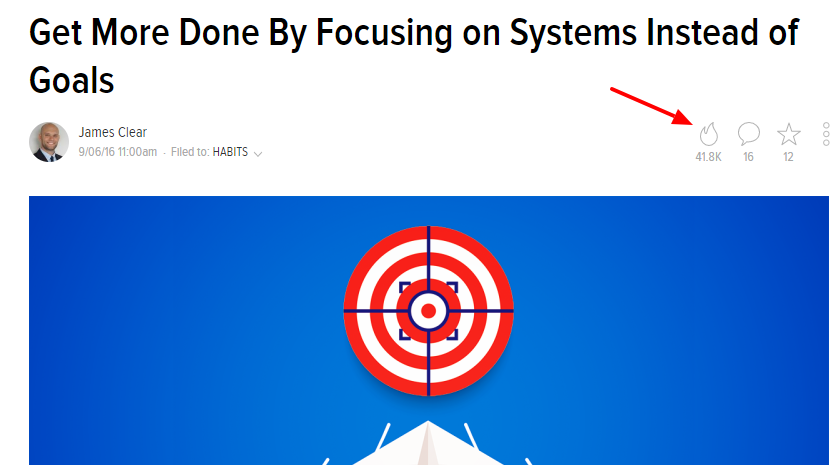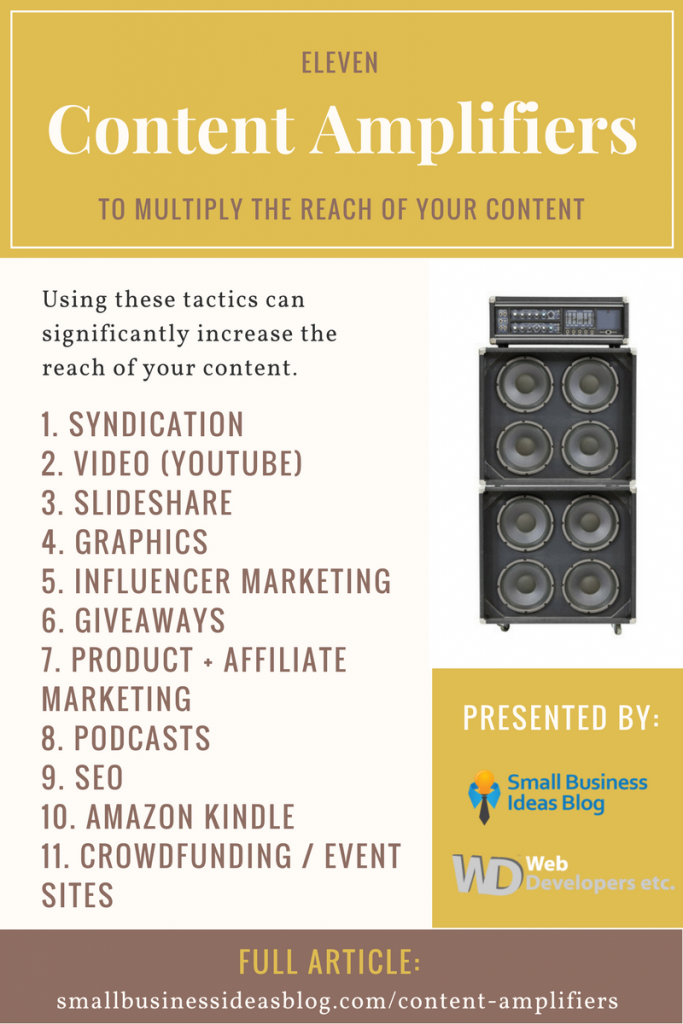 One of the biggest challenges that content marketers face is getting traffic to their blogs. Both content creation and content promotion are time consuming, but necessary steps to get results.
One of the biggest challenges that content marketers face is getting traffic to their blogs. Both content creation and content promotion are time consuming, but necessary steps to get results.
I’ve noticed that some influencers use certain tactics to greatly increase the reach of their content. I call these “content amplifiers” as incorporating these simple ideas into your content can greatly expand your reach, resulting in more targeted traffic and customers.
This effect is amplified even more as your own audience grows. Below, I’m going to share 11 powerful content amplifiers that influential bloggers are using to significantly increase their traffic and reach.
1. Syndication
One powerful way to amplify your content is through article syndication. Syndicating your article to high traffic websites is a great way to greatly increase exposure to your content and grow your following more quickly without doing too much extra work.
To succeed with syndication, a writer needs to write an article that is similar in length and structure as the site he or she hopes to syndicate on. For example, if I wanted to syndicate an article to Entrepreneur, I would have to make sure my article doesn’t contain too many technical terms or screenshots, is around 1000-1500 words and fits into one of their article categories.
Example: James Clear has been tremendously successful with syndication and has gotten his articles featured on Entrepreneur, Life Hacker, Huffington Post and other high traffic sites.
Here’s an example of a post that James syndicated to Life Hacker. By simply syndicating this post, his article received 40,000 additional views:
http://lifehacker.com/get-more-done-by-focusing-on-systems-instead-of-goals-1786245764

Buffer grew awareness of their brand by starting off with guest posting and then later syndicating their best content to major news sites like Huffington Post, Lifehacker and The Next Web, which has resulted in thousands of extra shares and views.
Syndication is a powerful way to expand the reach of your content quickly.
2. Videos
YouTube is another underutilized content amplifier. It takes more time and effort to create a video and a lot of bloggers are camera shy.
But YouTube videos can generate more traffic and awareness for your blog and brand. As your blog following grows, so will your YouTube views. And as your YouTube views grow, YouTube will start suggesting your videos to other YouTube viewers as well as ranking on YouTube search.
Furthermore, people who find your video useful can embed it on their own sites or blogs, which can drive up your YouTube views even more.
Additionally, videos can create a higher level of engagement than written content alone. Videos can allow other people to see who you really are, resulting in a higher level of engagement.
Example:
Here’s a great example is Ramit Sethi’s blog. In this post, Ramit discusses salary negotiation and adds a YouTube video part way down the page:
http://www.iwillteachyoutoberich.com/blog/salary-negotiation/
His video has accumulated over 200,000 views on YouTube and shows up in YouTube search for “salary negotiation”:
https://www.youtube.com/watch?v=twJbXSpTVFA
If a video is popular on YouTube, then YouTube will promote it as a related video to other videos and also rank it higher in YouTube search. This can drive traffic from YouTube to your site.
3. Slideshare
Another content amplifier is Slideshare. Embedding a Slideshare into your content can drive up the number of Slideshare views, which can in turn allow your Slideshare to get featured on the front page.
If you do a recorded presentation from your slides, you can also create a YouTube video with your content.
Here are a few good resources for marketing on Slideshare:
How Jonathan Coleman got over 1 million views from Slideshare
4 Lessons from Creating Over $20,000 worth of Slideshare presentations by Ross Simmonds
Important Note: Microsoft recently purchased LinkedIn and Slideshare. As of today, the Slideshare home page hasn’t been updated since February 2017, so the future of Slideshare as a marketing channel is uncertain.
4. Infographics / Graphics
One opportunity that a lot of bloggers are missing is using visual content as an amplifier. With the rising popularity of Pinterest, a well designed infographic can go viral and get shared for months and even years. Unlike tweets, pins will get displayed to Pinterest users long after they are originally pinned.
If you don’t have the budget or creativity to create an infographic, then a simple blog header can work. Canva is a good tool that you can use to easily create a blog header in just a few minutes.
You can use tools like Tailwind App or Buffer to schedule images to pin to Pinterest.
5. Influencer Marketing via Expert Roundups or Blogger mentions
Another tactic that I’ve used to amplify the reach of my content is expert roundups. What’s great about expert roundups is that you can use them even when you are just starting out and don’t have a huge audience yet.
With an expert roundup, you simply email influencers with a question, preferably one that they can answer quickly and easily. You can then feature their answers on an article on your blog with a link back to their website.
Roundups are considered authoritative because they contain the advice of several known experts in your field. And the experts that participate will often share your article on social media, which can drive a lot of traffic to your blog.
Another simple tactic that you can use is to mention another blogger in your article and link to their site. You can then use an email outreach to tell them that you mentioned them in your blog post.
Sometimes, they will find out on their own because a lot of professional bloggers are using brand monitoring tools like mention.com or Google alerts to get notified when they are mentioned online.
6. Giveaways
One powerful technique that you can use to leverage your audience is giveaways. Companies are often looking for ways to get exposure for their products and services and some companies will even provide free product for your giveaway, especially if you have an established audience.
Sometimes the company will even promote you to their audience if you are giving away their product.
You can use tools like Sumo Giveaways or Gleam.io to make your giveaway go viral. Basically, these tools reward people for referring others to your giveaway by giving them more entries and thus a higher chance of winning.
Joshua Earl grew his email list to over 60k in just two weeks using giveaways. Bryan Harris from Video Fruit tried this strategy too and was able to generate 2,239 subscribers in just 10 days.
You can even use giveaways to sell products. Greenbelly generated a list of 4,100 subscribers on a budget of just $75 by partnering with other known brands in their market to do a large giveaway.
For giveaways, make sure you give away something that is relevant to the audience that you are trying to attract. Don’t give away generic items like iPhones or gift cards.
7. Product Creation / Affiliate Marketing
Creating your own product and getting affiliates to promote it for a cut of the profits is another way to reach more people. The best part is that you also get paid in the process.
Product creation is challenging, however, and you should either learn copywriting or get a professional copywriter to create an effective sales page that converts visitors into paying customers. You’ll also have to spend more time creating a product that people are willing to pay for.
Once you have some sales data on your product, you can reach out to affiliates and ask them if they want to promote it for a cut of the profits. You can also add your product to affiliate marketplaces like Clickbank or JVZoo so that affiliate marketers can easily find your product.
8. Podcasts
Podcasting is a content amplifier as your podcast can drive additional traffic from iTunes, Stitcher and Blackberry.
Interviewing influencers on your podcast can also amplify your reach further as the influencer will often share the interview on social media. John Lee Dumas used this strategy to do a daily podcast and become the top podcaster in the business and marketing space.
If your podcast does really well when you launch it, it can even get featured on iTunes New and Noteworthy section. If you get featured, people on iTunes that are looking for new podcasts will discover you.
You can even upload your podcast audio to sites like Soundcloud, YouTube and Vimeo for additional exposure. Eric Sui from Growth Everywhere uploads his podcasts to YouTube by simply using a still image and adding audio to it, which allows it to gain dozens of extra views without much additional work.
9. SEO
SEO is another way to amplify the effectiveness of your content. Start by doing keyword research to find keywords that people are actually searching for and then create amazing content that addresses those keyword queries. Promote the content to get links and social shares to it and remember to link to it from other content on your site as well.
A lot of bloggers just write about what they feel like writing without regards to SEO. But articles that are properly targeted for search engine traffic can get ongoing traffic even long after the blog post was originally published.
I’ve written articles that were designed to get search engine traffic and articles where I just wrote about whatever I felt like writing. The articles that were SEO optimized continued to send traffic to my site while many of the other articles did not.
Here are a few good resources to learn the basics of SEO and start getting results quickly.
Moz’s Beginner Guide to SEO – Moz published a popular beginner’s guide to SEO that covers the basics if you are a total beginner.
Quicksprout’s Advance SEO Guide – Neil Patel and Sujan Patel teamed up to create an Advance SEO guide that covers some link building techniques and search verticals.
WordPress SEO Guide for Beginners – If you are using WordPress, then this guide goes into some of the settings you can adjust to optimize your site for SEO.
Skyscraper Technique – Brian Dean from Backlinko’s Skyscraper technique is a good content promotion resource for anyone trying to grow their blog or doing content marketing.
100+ Keyword Research Tools – A list of over 100 keyword research tools that I’ve compiled.
By the way, you don’t necessarily have to SEO optimize everything. It’s perfectly fine to create content for short term engagement as well. But adding keyword targeted content into your content mix is a good idea if you want to capitalize on ongoing traffic from the search engines.
10. Amazon Kindle Books
Publishing a book on Amazon is a great way to amplify your reach with your content, especially if you already have an audience. Books take more work than a blog post, but some eBooks are under 100 pages so you can actually write a book in less than two weeks.
Once you have your eBook written, you can quickly publish it in Kindle format and make it available on Amazon. Amazon’s KDP page provides some instructions on how to do this.
Dan Norris published a few books including 7-Day Startup and Content Machine. By sharing the launch with his email list, he was able to boost his sales rank and achieve best seller status. His books get traffic organically from Amazon recommendations and search terms like “content marketing”.
Other great benefits from publishing Kindle books are ongoing revenue and name recognition. Being a published author is a great credibility booster if you are trying to achieve expert status in your industry.
11. Crowdfunding or Event Sites
If you are hosting an event or launching a paid product, then you may want to consider using a crowdfunding or event site. One interesting trick I learned not too long ago was to use a crowdfunding site like Indiegogo to launch your product instead of using your own shopping cart.
If you can drive enough people to your crowdfunding campaign, then your campaign might get featured on the category page or even the front page. This can drive more leads and customers to your email list.
Since crowdfunding sites often showcase new and interesting products, your product might even get seen by bloggers and journalists and get media coverage if it is unique and interesting.
Event sites like Eventbrite can also be good places to list your event and get found by people on that site. You can even list virtual events, although you may have to pick a city to display your event in.
Other Tips
You may not want to add all of these amplifiers to one blog post. Having a YouTube video, Slideshare and infographic might be too much content in a single post. Readers may get overwhelmed or choose not to watch the video, for example, because there are too many other things competing for attention.
Instead, if a piece of content does well, create a new article at a later date and repurpose the content into a different format. For example, perhaps you created a blog post with infographic and it was popular with your readers. In the future, you can create a new post with the same information, but with a YouTube video on it.
Are you using any of these tactics to amplify your content’s reach? And do you know of any other content amplifiers?

This is such an insightful post! Content amplifiers are truly game-changers when it comes to maximizing reach and engagement. I especially agree with the point about leveraging influencers and communities—they can add so much credibility and trust to your content.